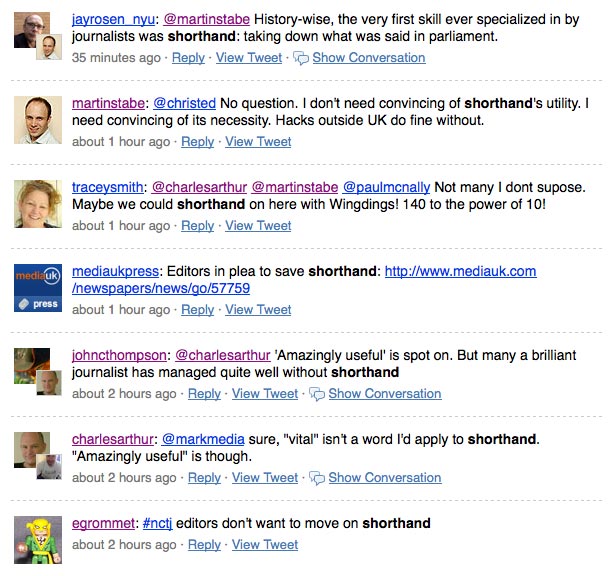The National Council for the Training of Journalists (NCTJ) requires you to have shorthand at 100wpm in order to pass the course. When I first started my course 17 weeks ago I wasn’t very hopeful of reaching that speed.
Now 100wpm is doable – as long as you don’t get an exam about time capsules being buried with silver trowels, as I did last week, and can control your nerves. More on this later.
After reading a post on the Journalism.co.uk forum from a student, who was worried that they will not be able to get to 100wpm, I wanted to offer some hope.
Here’s my hope in a post:
Practice
In my first post on this blog I made a reference to my shorthand teacher insisting we did two hours a day shorthand practice.
It may seem obvious but practice is everything. I have been doing an hour of practicing special forms (see below) and an hour of dictations most days. If you don’t have time you have to make time. Partners, friends, dogs and life in general have to take a back seat.
That said, if you really can’t do two hours a day, doing some every day and keeping it consistent is better than nothing.
Special Forms and Common Words
My teacher advised us to create a special forms notebook out of an address book. This has become such a useful thing to have.
I, and a lot of people in my class, have written out all the special forms and common words onto an Excel sheet. I have a master sheet with all the outlines written in and a blank sheet so I can fill in the outlines. You can do this on the tube, at the doctors, in the lunch queue – anywhere where you have a spare moment. The Teeline Gold Word List is also a useful dictionary to have kicking about. You can always sell it to a student after you finish.
Dictations
Actual dictations at various speeds are really helpful for practicing. Hopefully your tutor will have some to give you. If not, or if you are doing a distance course, you can also order them from the NCTJ website or there are some great free ones on We Love Shorthand that go from 50–120 wpm.
The trick is to do a speed that is faster than where you are. So if you think you’re just about at 60wpm do the 80s. You won’t be able to get it all down at first, but you will eventually and it will make the 60 sound painfully slow and easy.
The same goes for the 100: do the 110s and 120s. It will blow your mind and you’ll get cramp, but it makes the 100 sound slow.
We Love Shorthand also has a rather strange music section called ‘And now for something completely different’. One would imagine that it is there to bring you back from the brink of doing 120wpm…
Pens and Paper
If you’re reading this and have only just started, bear with me. The right pen and even the right kind of paper can make all the difference. My group at college has whole conversations about the virtues of a certain type of pen – granted we need to get out more.
Try out loads of pens to see which one suits you best. I started with a biro but found it ran out or was patchy at a crucial moment meaning I missed whole sentences. I have settled on a Pilot V Ball 0.5, but other people in my class are using cheaper pens from Muji and swear by them.
The kind of paper and the way you fold it can also make a difference. I use A4 lined paper and fold it in half because it takes ages to bring you hand back across a sheet of unfolded A4 meaning you could miss words.
I have also been using narrow ruled paper. This was good for making my outlines smaller (supposedly the smaller your outlines the faster you are) but a word of warning here: I used narrow ruled in my exam and found it very hard to read back my nervous scrawl. Again it’s just about practice and what works for you.
Exams
The 100wpm exam is not as hard as you think it’s going to be and if you’ve been practicing with 120wpm then it will seem slow.
These exams are like taking your driving test. You can be excellent and at 100wpm but still fail because you’re nervous or get a hard dictation (silver trowel? Do me a favour).
Go in thinking you can do it and RELAX. This is hard and nerves have got the better of me two times now. Try Rescue Remedy or anything that you know calms you down. My Mum suggested I had a gin and tonic before going in but I’m not going to suggest that as an option (hic).
Do not be downhearted if you fail.
You can do it again.
Never give up.
Good luck.

